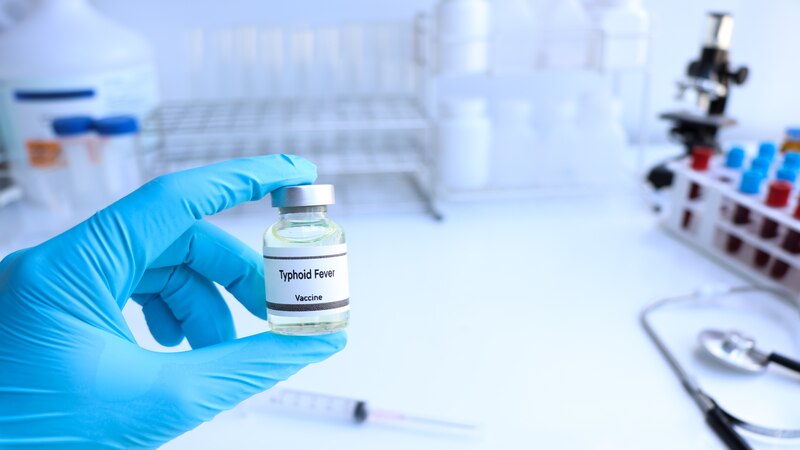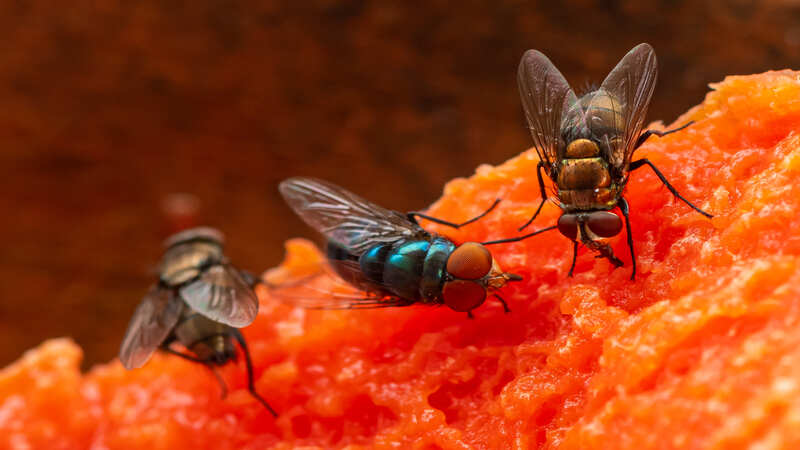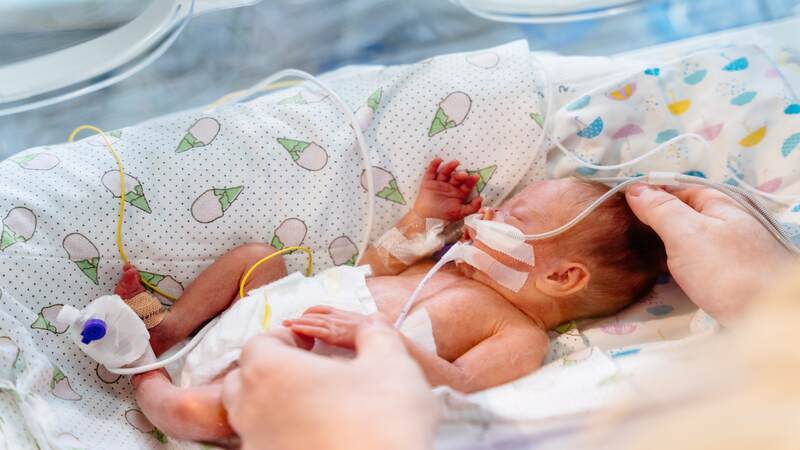 Typhoid is a bacterial infection that is spread through contaminated food and water. It requires medical diagnosis and needs to be treated on time. During pregnancy, women need to take precautions and maintain proper hygiene to avoid severe infections like typhoid as it can impact growing fetuses.
Typhoid is a bacterial infection that is spread through contaminated food and water. It requires medical diagnosis and needs to be treated on time. During pregnancy, women need to take precautions and maintain proper hygiene to avoid severe infections like typhoid as it can impact growing fetuses.
Another important reason is the antibiotic resistance among bacteria salmonellae which makes initial treatment difficult. Thus, to help you understand the signs, symptoms, treatment options, and precautionary measures, we’ve covered a handful of information about typhoid during pregnancy.
What Causes Typhoid In Pregnancy?
Typhoid fever or enteric fever is a life-threatening and serious infection occurring in developing nations due to the scarcity of cleanliness and other sanitation measures. The acute infection is caused by Salmonella typhi. A milder form of infection, Paratyphoid is caused by Salmonella Paratyphi bacteria through contaminated food, especially food that has not been cooked or stored properly. Living in unsanitary conditions or drinking contaminated water can increase your chances of getting typhoid in pregnancy (1).
How Does Typhoid Infection Spread?
 Typhoid fever is transmitted by eating or drinking contaminated food or water that has been infected by the typhoid bacteria. The typhoid bacteria can thrive in the dried sewage or water for weeks. It is seen that around 3 to 5 percent of typhoid-affected people become carriers of the disease post-acute attack. Often they remain unrecognized for years.
Typhoid fever is transmitted by eating or drinking contaminated food or water that has been infected by the typhoid bacteria. The typhoid bacteria can thrive in the dried sewage or water for weeks. It is seen that around 3 to 5 percent of typhoid-affected people become carriers of the disease post-acute attack. Often they remain unrecognized for years.
After eating contaminated food or water, typhoid bacteria enter the body and invade the small intestine thereby entering the blood circulation. The invading bacteria are taken by white blood cells to the spleen, liver, and bone marrow where they further proliferate and re-enter the blood circulation. Typhoid bacteria affect the biliary system, bowel’s lymphatic tissues, and gall bladder and pass in large numbers in stools. The stool samples can be investigated for their presence, besides the blood samples (2).
What Are The Symptoms Of Typhoid During Pregnancy?
The period of incubation is around 1 to 2 weeks and the following symptoms are usually present:
- High-grade fever (103 to 104 degrees Fahrenheit)
- Loss of appetite
- Headache
- Sore throat
- Generalized pains and aches
- Lassitude or lethargy
- Diarrhea
- Vomiting
- Chest congestion
- Abdominal pain and discomfort
If you experience any of the above or similar symptoms immediately consult your obstetrician. The high-grade fever becomes constant and is often accompanied by abdominal cramps.
How Is Typhoid Treated During Pregnancy?
 The treatment of enteric fever is mainly with antibiotics that destroy the Salmonella bacteria, but the use of antibiotics is restricted during pregnancy and this is the main problem with typhoid treatment during pregnancy. If you notice high-grade fever immediately report it to your obstetrician for further diagnosis and proactive treatment.
The treatment of enteric fever is mainly with antibiotics that destroy the Salmonella bacteria, but the use of antibiotics is restricted during pregnancy and this is the main problem with typhoid treatment during pregnancy. If you notice high-grade fever immediately report it to your obstetrician for further diagnosis and proactive treatment.
If left untreated, typhoid fever might last for a month or even more so immediate treatment is very important. It becomes fatal and can cause death. If the fever is not treated, the symptoms worsen and the infected person may:
- Lose weight
- Develops rashes on the abdomen and lower chest
- Have a bloated belly
Can I Get a Typhoid Vaccine During Pregnancy?
Typhoid vaccine can be taken orally or in an injectable form. Oral vaccine is not considered safe during pregnancy, though injectable ones can be safe. Insufficient research has been carried out on the subject. Moreover, typhoid vaccines do not provide full protection against the infection. However, babies after birth are vaccinated for typhoid fever within the first year of their birth (3).
How Does Typhoid Affect The Fetus?
 Salmonella is notoriously famous for causing abortion especially if left untreated. The infection can reach the baby to potentially put you at a risk of miscarriage, premature birth, or a low birth weight baby. Septic and early second-trimester abortions are often seen in typhoid-affected pregnant women. Because most typhoid patients are restricted to a liquid diet, there is a good chance that you and your baby miss out on healthy nutrition.
Salmonella is notoriously famous for causing abortion especially if left untreated. The infection can reach the baby to potentially put you at a risk of miscarriage, premature birth, or a low birth weight baby. Septic and early second-trimester abortions are often seen in typhoid-affected pregnant women. Because most typhoid patients are restricted to a liquid diet, there is a good chance that you and your baby miss out on healthy nutrition.
If the typhoid-affected pregnant woman receives proper treatment the child born is usually healthy and safe.
What Precautions Can I Take Against Typhoid When I Am Pregnant?
Here is a list of what to avoid if you want your pregnancy to be protected from the hazards of typhoid fever. Hygiene and personal cleanliness are very important aspects in the prevention of typhoid fever.
- Wash hands with soap and water before and after every meal
- Use a sanitizer if soap and water are not available
- Use boiled water for cooking and washing fruits and vegetables before cooking
- Eat well-cooked food as heating kills bacteria
- Do not eat raw fruits and vegetables
- Avoid eating food items and beverages from the street vendors
- Use clean glasses and other utensils for drinking and eating food items
- Even ice can also be contaminated, so avoid taking ice from street vendors
- If you buy mineral water bottles, check whether they are sealed and the cap is properly intact
- Do not drink water from pots and public taps
What Are The Complications Of Typhoid?
 Here are mentioned some serious health ailments that can result in complications of typhoid fever:
Here are mentioned some serious health ailments that can result in complications of typhoid fever:
- Gastrointestinal diseases
- Intestinal perforation
- Liver failure
Less frequent complications include:
- Lung problems
- Cardiac problems
- Bone and joint infections
- Infections of the urinary tract
- Mental problems
- Septic abortions
- Premature delivery
Typhoid during pregnancy can lead to severe complications such as perforation of the intestine, internal bleeding, and still childbirth. If you have symptoms of typhoid, it is vital to seek doctors’ attention promptly for appropriate treatment. Additionally, you can practice good hygiene, get vaccinated on time, and avoid eating or drinking contaminated food or liquids.
FAQ’s
1. Can I Get Typhoid During Pregnancy From My Partner?
Yes, you can. It is contagious. Stay away for both your and baby’s safety.
2. Can Typhoid Affect My Pregnancy?
Typhoid fever can make a pregnant woman weak. If treated properly, the baby can be safe. if not treated in time, it can be fatal.
3. Can I Take Antibiotics for Typhoid, if Pregnant?
Yes, you can. You don’t have much choice here. If typhoid is not treated, it can become fatal for the baby.
4. What Type of Typhoid Vaccine Should Pregnant Women Take?
There is not much research on this. Many suggest taking the injection. Check with your doctor.
5. How Can I Recover From Typhoid During Pregnancy?
You can treat typhoid during pregnancy by using antibiotics such as chloramphenicol and ampicillin/amoxicillin. However, before you take any medication, do take advice from expert healthcare providers.
6. Can typhoid be transmitted from mother to child?
Yes, typhoid can be transmitted from mother to child during pregnancy and cause neonatal typhoid. The vertical transmission of typhoid from mother to child can cause several complications such as stillbirth, miscarriage, neonatal sepsis, and preterm labor.
References
- CDC.gov – https://www.cdc.gov/typhoid-fever/about/index.html
- Ismail A. New advances in the diagnosis of typhoid and detection of typhoid carriers. Malays J Med Sci. 2000 Jul – https://www.ncbi.nlm.nih.gov/pmc/articles/PMC3438001/#
- NHS, Typhoid Vaccination – https://www.nhs.uk/conditions/typhoid-fever/vaccination/#

